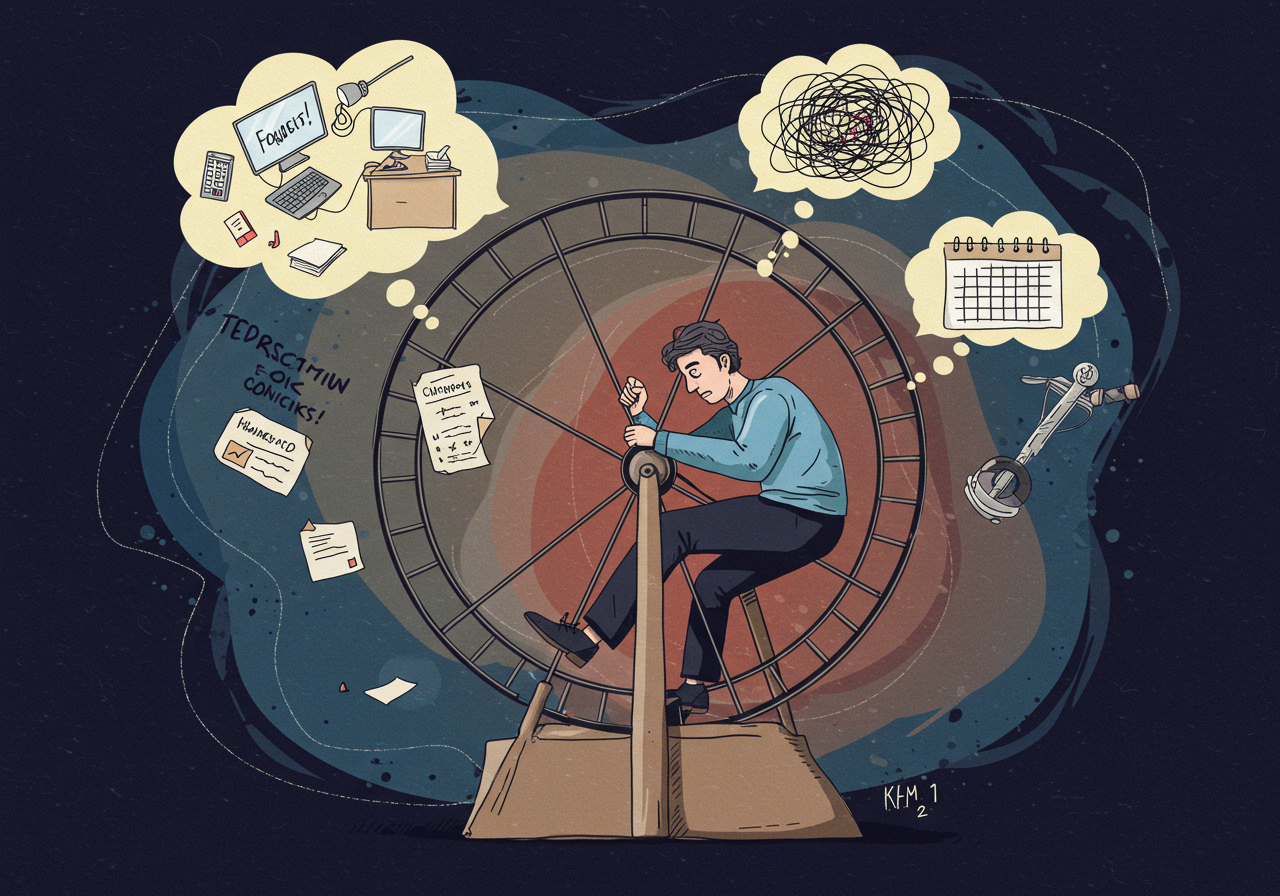Adult ADHD Symptoms: Beyond Hyperactivity & ADHD Test
Do you ever feel like you're constantly running on a hamster wheel, struggling with forgotten appointments, messy desks, and a brain that refuses to quiet down? If you feel overwhelmed and disorganized but don't see yourself in the classic image of a hyperactive child, you're not alone. The landscape of adult ADHD is far more nuanced than many realize. This article explores the subtle, often-missed adult ADHD symptoms that go beyond the stereotype. If you've ever wondered, Do I have ADHD?, understanding these signs is the first step toward clarity. Our free ADHD test can be a valuable tool on this journey of self-discovery, offering initial insights into your unique cognitive patterns.

Unpacking Inattentive ADHD Symptoms in Adults
When many people think of ADHD, they picture constant motion. However, for a vast number of adults, the biggest challenges are internal and quiet. This presentation, often referred to as Predominantly Inattentive ADHD, is frequently overlooked precisely because it isn't disruptive to others. Instead, it creates a silent, internal struggle with focus, consistency, and follow-through. Recognizing these traits is crucial for understanding why certain aspects of daily life might feel like an uphill battle. If this resonates with you, an ADHD screening test could help you connect the dots.
The Overlooked Signs of Inattention in Daily Life
Do you find yourself making careless mistakes at work, even when you know the material? Perhaps you zone out during conversations or meetings, only to realize you've missed key details. These are hallmark signs of inattention. It’s not a matter of intelligence or caring; it’s about the brain’s difficulty in sustaining focus. This can manifest as:
-
Poor attention to detail that leads to errors.
-
Difficulty listening, even when spoken to directly.
-
Losing essentials like keys, wallets, or phones.
-
Being easily distracted by external stimuli or internal thoughts.
-
Trouble finishing tasks, from work projects to household chores.

Executive Dysfunction: More Than Just Procrastination
Procrastination is a universal human experience, but for adults with ADHD traits, it's often a symptom of something deeper: executive dysfunction. Executive functions are the brain's "management" skills—the high-level mental processes that allow us to plan, organize, initiate tasks, regulate emotions, and manage time. When these functions are impaired, life can feel chaotic. It's the reason why a simple task like "clean the kitchen" can feel impossibly large, or why you know you need to start a project but feel physically unable to begin. This isn't laziness; it's a genuine challenge in activating and organizing your actions.

Understanding ADHD in Women: Unique Presentations
For decades, ADHD was considered a condition primarily affecting boys. This misconception has left generations of women undiagnosed, struggling in silence. ADHD in women often presents very differently, with symptoms that are more internalized and less obvious to outsiders. This leads to misdiagnoses of anxiety or depression, while the root cause remains unaddressed. The constant effort to hide these struggles can be exhausting, making a confidential assessment a critical first step. You can start your confidential screening today with a private online screening.
Internalized Hyperactivity and Emotional Dysregulation
While a boy with ADHD might be running around the classroom, a girl or woman might experience hyperactivity internally. This can feel like a mind that never stops, with racing thoughts, constant worrying, and an inner sense of restlessness. Furthermore, emotional dysregulation is a core, yet often unrecognized, symptom. This involves feeling emotions more intensely than others and struggling to manage them. Small frustrations can quickly escalate into overwhelming anger or despair, leading to what many describe as an "emotional rollercoaster."
Masking and Social Chameleon Behaviors
From a young age, girls are often socialized to be people-pleasers and to not cause trouble. Consequently, many women with ADHD become experts at "masking"—developing complex coping strategies to hide their symptoms and appear "normal." They might overcompensate by being meticulously organized in one area of life while others fall apart, or by mimicking the social behaviors of their peers. This social chameleon act is a survival mechanism, but it can lead to a profound sense of burnout and feeling like an imposter, contributing to undiagnosed ADHD.

Beyond the Stereotype: Combined & Hyperactive-Impulsive ADHD in Adults
While inattentive symptoms are common, it's also important to recognize that hyperactive and impulsive traits can persist into adulthood, though they may look different than they do in children. Many adults experience a combination of inattentive and hyperactive-impulsive symptoms. An adult ADHD test can help identify which traits are most prominent for you. Understanding how these symptoms evolve is key to a complete picture of adult ADHD.
Subtle Hyperactivity and Impulsivity in Adulthood
The boundless energy of a hyperactive child often transforms into a subtler, more internal feeling of restlessness in adults. This can manifest as constant fidgeting (tapping a pen, shaking a foot), feeling unable to relax, or talking excessively. Impulsivity can also be less physical and more verbal or financial. It might look like:
- Interrupting others frequently in conversation.
- Making impulsive purchases you later regret.
- Starting new hobbies or jobs on a whim and abandoning them quickly.
- A general sense of impatience and a low tolerance for frustration.
Could You Have Adult ADHD? Your First Step to Clarity.
Recognizing yourself in the descriptions above can be a powerful, and sometimes emotional, experience. Adult ADHD is not a character flaw or a failure of willpower; it is a neurodevelopmental condition with real, tangible impacts. Understanding its diverse presentations—from silent inattention and executive dysfunction to the unique challenges faced by women—is the first step toward self-compassion and finding effective strategies.
If you see your own struggles reflected in these symptoms, you are not alone. Gaining clarity is the next crucial step. An online screening tool can provide a valuable, private, and pressure-free starting point. The confidential ADHD screening tool is designed to give you a personalized, AI-driven report based on scientifically informed questions. This report can help you organize your thoughts and serve as a helpful document if you decide to speak with a healthcare professional.

Common Questions About Adult ADHD Symptoms & Screening
How is ADHD tested in adults?
A formal ADHD diagnosis is conducted by a qualified healthcare professional, like a psychiatrist or psychologist. The process typically involves a detailed clinical interview about your personal, academic, and work history, a review of your symptoms (both now and in childhood), and often includes standardized rating scales or questionnaires filled out by you and sometimes a loved one.
Can you test for ADHD online?
Yes, you can use an online ADHD test as a screening tool. While websites like ours cannot provide a medical diagnosis, they are designed to be a highly effective first step. Our test helps you assess your traits against established criteria in a confidential setting. The personalized AI report from our free online ADHD test gives you valuable insights and a solid foundation for a conversation with a doctor.
What are the common symptoms of adult ADHD beyond hyperactivity?
Many common symptoms of adult ADHD are not related to physical hyperactivity. These include profound difficulties with executive functions (planning, organization, time management), chronic procrastination, poor attention to detail, forgetfulness in daily activities, emotional dysregulation (intense mood swings), and a persistent feeling of being overwhelmed or unable to reach your potential.
Is this online ADHD test accurate?
Our online ADHD test is designed to be a reliable and accurate screening instrument. It is built upon widely recognized psychiatric screening standards to assess for potential ADHD traits. However, it's crucial to remember that it is a screening tool, not a diagnostic one. Its purpose is to provide preliminary insights and identify if your experiences warrant further professional evaluation, not to replace the comprehensive assessment of a healthcare provider.